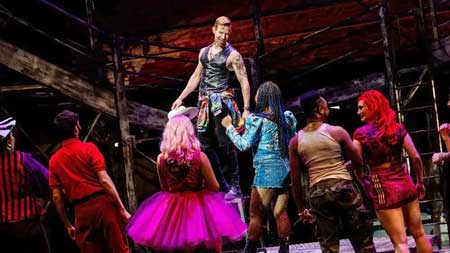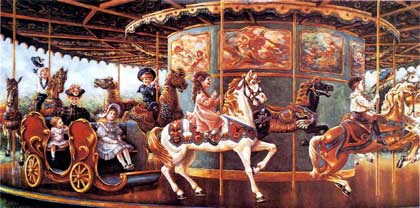Musical (1945)
Music by Richard Rodgers
Book and Lyrics by Oscar Hammerstein II
Based on Ferenc Molnar’s play Liliom (1909)
As adapted by Benjamin F. Glazer
Original Choreography by Agnes de Mille
Boston Lyric Opera
April 4-13, 2025
Conductor: David Angus; Stage Director: Anne Bogart; Choreographer: Shura Baryshnikov; Set Designer: Sara Brown; Costume Designer: Haydee Zelideth; Lighting Designer: Brian H Scott;Wig & Makeup Designer: Earon Chew Nealey; Intimacy Director / Fight Director: Angie Jepson; Sound Engineer: Steve Colby
With Brandie Sutton (Julie Jordan), Edward Nelson (Billy Bigelow), Jamie Barton (Nettie Fowler), Anya Matanovič (Carrie Pipperidge), Omar Najmi (Enoch Snow), Markel Reed (Jigger Craigin), Sarah Heltzel (Mrs. Mullin), Lee Pelton (Starkeeper/Dr. Seldon), Theophile Victoria (David Bascombe), Tyler Dobies (Policeman), Devon Russo (1st Man), Fred C. VanNess, Jr. (2nd Man), Alexander Davis (Captain), Sabrina Lobner (Principal), Angela Yam (Heavenly Friend #1), Abigail Marie Curran (Louise), John Robert Sasso (Enoch Snow, Jr.), Olivia Moon (Dancer), Jay León (Dancer), Cassie Wang (Dancer)
In Maine some years back, Julie Jordan (Brandie Sutton) falls in love with Billy Bigelow (Edward Nelson), a guy who tends the carousel at the local park. They get married, but Billy gets very worried about money when Julie declares that she is pregnant. Not well paid, Billy gets hooked into a caper with Jigger Craigin (Markel Reed), a no-goodnik who has some ideas about how to make fast cash. The caper does not turn out well, and Billy suffers as a result. (See spoilers section below if you want to know more.) Meanwhile, Julie’s friend Carrie Pipperidge (Anya Matanovič) has a thing going with Enoch Snow (Omar Najmi) which gets a bit jostled by Jigger’s attentions to Carrie. Due to his misfortunes, Billy winds up in the afterlife and is given the option to see what’s going on with his family; he encounters Julie and their somewhat grownup daughter Louise (Abigail Marie Curran), and Billy takes the option to come and take a closer look.
This show has some truly classic songs that have stood the test of time, and when one hears them, often multiple times within the course of the show, they bear out the reputation that the show has gained over the years. Those wonderful songs, with moving melodies by Rodgers and penetrating and heartfelt lyrics by Hammerstein, certainly do hit the spot. Among these are the iconic If I Loved You, June Is Bustin’ Out All Over,You’ll Never Walk Alone, and What’s The Use of Wondrin’?.

Brandie Sutton as Julie Jordan (in blue, below)
and the cast of “Carousel”Photo: Nile Hawver
Courtesy of Boston Lyric Opera
As well, there are songs, a bit less well-known, which have quite witty lyrics by Hammerstein, often set in an unexpected vernacular, which make the portrayals of this fairly rough seaside community in Maine seem more authentic. These, though familiar, fit more into that category: That Was a Real Nice Clambake, When I Marry Mister Snow, You’re a Queer One, Julie Jordan .
Sweeping swaths of music, often long and unaccompanied by lyrics, provide an opportunity for considerable choreography which, in the original production was done by Agnes de Mille, and which, for this production, was done by Shura Baryshnikov. Indeed, the dancing here is excellent and Baryshnikov and the troupe are to be highly commended for great dance scenes throughout. In the second act near the end, Louise (Abigail Marie Curran), the young adult daughter of Julie and Billy, has a wonderful dance solo and Curran pulls it off with considerable grace and adeptness, and, as well, conveys her character with gravitas and poise.
The staging is incredibly colorful, with superb costume design by Haydee Zelideth and hair design by Earon Chew Nealey. The color choices are striking and way out there, providing a surreal but wonderful enhancement to the production. The cast is very large and all of them seem amply embellished with delightfully vivid outfits and hair to match.
The orchestra under David Angus plays superbly, adjusting its capacities for typical operatic fare to execute the more popular swaths of Rodgers’ music, though not necessarily less difficult to play in some spots than the more classical fare. One should mention, in particular, beautifully executed violin solos throughout by principal Annie Rabbat in addition to the excellent playing all around.
Voices are very capable with lovely moments by Sutton, Nelson and Najmi. When he has his solo, Najmi offers some particularly notable lyricism. As Carrie, Anya Matanovic is lively and captivating.The staging by Anne Bogart and the set by Sara Brown offers a dominant image of a community caught behind a prison gate of some sort, which, given the otherworldly theme, may suggest the gates of heaven, though the penal connotations are not entirely clear. Characters dressed as police open, closed and tended the gates, especially and act intervals, perhaps suggesting the implicit bondage of the world depicted, or perhaps of the world in general.
The cast and chorus is enormous, and omnipresent, sometimes offering a good amount of public energy, but, at other times, seeming a bit like hangers-on. Though their outfits and hair are indeed colorful, one is not always sure of what the characters are doing there.
Hammerstein’s book, adapted from Ferenc Molnar’s play, has its moments, but also some liabilities – there’s a quite straightforward and not entirely fascinating quality to the narrative. Though now classic and iconic and not subject to much alteration, some of the fat could be trimmed in this quite long musical – the long seduction scene between Jigger and Carrie is an obvious case in point.
Wikipedia
The most popular songs recapitulate multiple times which is endearing, but that leaves an overall sense that the number of noteworthy songs is relatively few. This is quite different from some of the later Rodgers and Hammerstein hits – think of South Pacific or The Sound of Music – in which one memorable song follows another.
– BADMan (aka Charles Munitz)

Leave a Reply